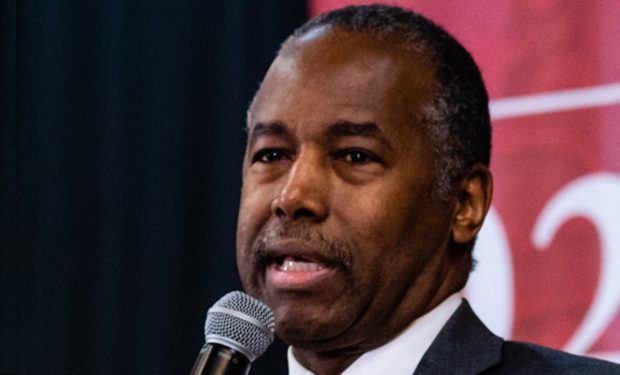The presumptive GOP presidential nominee, former President Donald Trump, narrowed his list of VP picks to eight last week. He reportedly sent vetting documents to the contenders including Senators Marco Rubio (FL), JD Vance (OH), North Dakota Governor Doug Burgum, and the oldest of the bunch, 72-year-old retired neurosurgeon Ben Carson.
[Note: When Carson suspended his 2016 GOP presidential campaign, he endorsed and campaigned for Trump — and once in the White House, Trump appointed Carson Secretary of Housing and Urban Development. Carson was one of the few cabinet members in the Trump administration to serve all four years.]
Carson is currently campaigning for Trump again — as seen below at the Turning Point event this weekend in Detroit — and urging MAGA poll watchers to disobey election officials at the polls on Election Day.
WATCH: Moments like this are why Trump may pick Dr. Ben Carson to be his Vice President. The way he articulates election integrity issues, even to the last detail is AMAZING
— George (@BehizyTweets) June 15, 2024
"We don't accept if they say the signatures [mail-in ballots] don't match. We don't have to accept if… pic.twitter.com/EJspCgMrFz
Carson told the crowd: “If you’re a poll watcher, don’t listen to the people who say, ‘you can watch the poll, but you gotta do it from way over there where you can’t see anything,'” he pointed to the far corner of the auditorium. “We don’t have to accept that.”
The crowd cheered and Carson added: “we don’t have to accept it if people don’t have voter ID. We don’t have to accept any of these things.”
Note: Each state sets its own voter ID rules, and most require voters to bring identification to vote in person.
According to the U.S. Election Assistance Commission, the role of a poll watcher (also known as “election observer”) is “to observe and monitor the election, without violating voter privacy or disrupting the election.”
Each state has its own laws and procedures “on when and where observers can be present, as well as who can observe the election.”
Poll watchers are different from challengers “who are authorized to raise concerns either with the election process or to challenge whether a voter is eligible to cast a ballot.” Again, rules regarding challengers vary by state.
